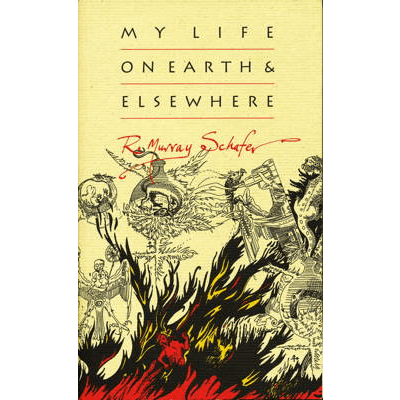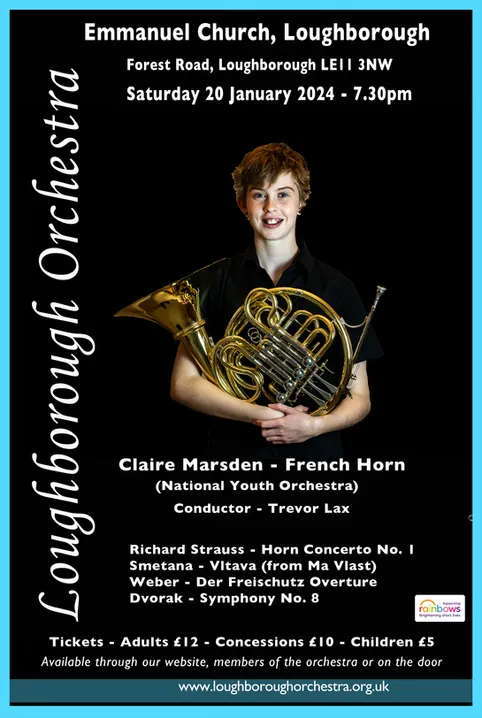 SPONSORED: So Much, for So Many. R Murray Schafer's 'My Life on Earth and Elsewhere', read by A P Virag.
SPONSORED: So Much, for So Many. R Murray Schafer's 'My Life on Earth and Elsewhere', read by A P Virag.
All sponsored features >>
 DISCUSSION: John Dante Prevedini leads a discussion about Music and the Visual World, including contributions from Celia Craig, Halida Dinova and Yekaterina Lebedeva.
DISCUSSION: John Dante Prevedini leads a discussion about Music and the Visual World, including contributions from Celia Craig, Halida Dinova and Yekaterina Lebedeva.
- Michael Edgar Oliver
- Liebestod
- harpist
- Handel: Alcina
- St John's Smith Square
- Louise Farrenc: Symphony No 3
- Paul Merkelo
- Benjamin Jabar
A Miraculous Achievement
Claire Marsden visits Loughborough to play the Richard Strauss Horn Concerto No 1
A terrific programme was presented last weekend by the Loughborough Orchestra in Leicestershire, UK. Its concert in Emmanuel Church, in the East Midlands town celebrated for outstanding sporting achievement, culminated in Antonín Dvořák's Eighth Symphony. (For a long time it was known as his Fourth, at a time when only the last five were recognised. When the real numbers one to four were added, it became No 8.) In that gloriously expressive work the flutes have a special and prominent place.
In Carl Maria von Weber's scintillating overture Der Freischütz it is the horns that add to shivering woodwind to evoke the eerie ambience of the horrific Wolf's Glen. And in Bedřich Smetana's tone poem Vltava - one of six tone poems collectively entitled Má Vlast, 'My Country' or 'My Fatherland' - also known in German as Die Moldau (for both Smetana and Dvořák when schoolboys German was the second language) - the sensational playing of the searching strings, and the exciting growth to virtually a flood is alluring, then gripping.
That same work, Vltava, was also played, prior to a magnificent and courageous handling of Richard Strauss's gargantuan (and, not least for the brass, exhausting) symphonic poem An Alpine Symphony by the National Youth Orchestra of Great Britain (NYO or NYOGB) under Sir Mark Elder on its visit to Warwick University's Arts Centre.
The link here is that in the Loughborough Orchestra's winter concert it was the NYO's joint first horn, Claire Marsden, who sizzled at the very start with Strauss's sparkling Horn Concerto No 1, in E flat. This dates from 1882-3 and was written in Munich when he was just eighteen - his father, Franz, was one of Europe's supreme horn virtuosi at the time - and is thus one of the composer's earliest works. His major symphonic poems Aus Italien - too little known - the sweeping Don Juan, Macbeth and the endlessly inspiring Tod und Verklärung (Death and Transfiguration) all followed in the 1880s. Paradoxically his not dissimilar Horn Concerto No 2 - also, as it happens, in E flat major - was one of his last works, composed whilst living in Nazi-annexed Vienna in 1942, and premiered at the 1943 Salzburg Festival.
Claire is only seventeen, and Strauss's concerto is a work that would pose ample problems for a brass player of any age. The fact that, still a teenager, albeit an advanced and amazingly proficient one, she had the ability to attack this soaring and searing work - and indeed, that she was considered by their sage long-term conductor, Trevor Lax, himself a distinguished brass (trumpet) player, and shortly to retire as the orchestra's sole music director, to be up to the job, speaks reams for this young performer (pictured here).

Loughborough Orchestra's concert poster for
20 January 2024, featuring Claire Marsden
By her sensitive teasing out of the Allegro's alluringly chorale-like melody, she instantly enchanted not just the Loughborough audience, but members of the orchestra itself, entranced by such a uniquely dazzling young brass player, and by the obvious quality and unforgettable dexterity of her musicianship.
Strauss wrote to his father of the 'incredible reliability' of the staggering principal horn soloist of the Meininger Hofkapelle orchestra, at the work's world premiere in Thuringia. The same might surely be said of this staggering young performer, just a year younger than Strauss when, still a student, he wrote his Concerto No 1.
Strauss's central slow movement, a serene, laid-back and reflective Andante con moto - linked with the first, all three movements are designed to be played attacca, fusing together - benefited masterfully from Claire Marsden's formidable adult expertise, evident throughout her bewitching performance from the solo's perfectly structured and hypnotising interaction with Loughborough's dedicated and responsive orchestral forces.
It was a mighty challenge, a towering feat, and the fact that she played with such command, magnificently memorised and gripping from the famously dizzying opening arpeggios, while still showing empathy with the wide-ranging colours and expression of the orchestral players, all added up to a miraculous achievement. This young virtuoso is clearly destined to go far.
Posted 27 January 2024 by Roderic Dunnett



